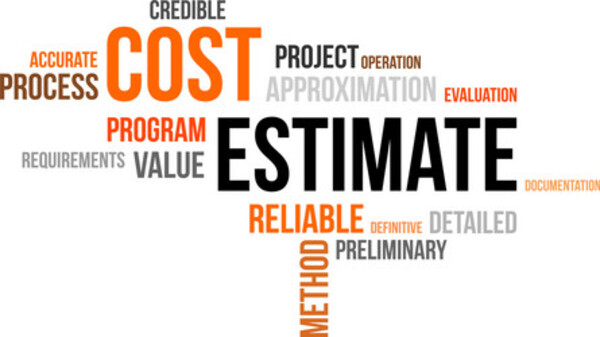
AI-Driven Estimation Tools: Boosting Accuracy in Cost Estimation
In the relentless pursuit of success in today's hyper-competitive business arena, one fundamental element stands as a linchpin of triumph: accurate cost estimation. It's the cornerstone upon which projects are conceived, planned, and executed, whether it's the construction of a skyscraper, the development of cutting-edge software, or the orchestration of a game-changing marketing campaign. The capacity to gauge costs with precision isn't just a valuable asset; it's a decisive factor that can propel an initiative toward prosperity or plunge it into uncertainty.
In the era of technological innovation, we are witnessing a transformative shift in the way businesses approach cost estimation, thanks to the pioneering contributions of artificial intelligence (AI) and machine learning. These advancements are breathing new life into the age-old practice of cost estimation, turning it into an arena where errors are minimized, precision is maximized, and decision-makers are armed with powerful insights.
In this comprehensive article, we embark on an exploration of AI-driven estimation tools and their paramount role in the contemporary business landscape. These tools are more than mere instruments; they are the architects of precision and the sentinels guarding against financial pitfalls. Our journey will unravel how AI and machine learning are not just instruments of automation but the harbingers of a new era, redefining how cost estimation is conducted, how errors are mitigated, and how precision becomes an attainable standard.
The Significance of AI in Cost Estimation

Unlocking the Power of Data-Driven Precision
AI-driven estimation tools are akin to data virtuosos when it comes to analyzing extensive historical cost data. They possess an unparalleled ability to sift through mountains of financial records, transaction histories, and expenditure details, all at a pace that would be inconceivable for a human estimator. This data-driven approach isn't just a fancy buzzword; it's the backbone of precision in cost estimation.
By harnessing AI for the analysis of cost data, organizations break free from the constraints of subjective judgment, a common pitfall in human estimation. Instead, they entrust the task to algorithms and models meticulously refined through the examination of extensive historical data. This reliance on empirical data, as opposed to intuition, yields more reliable and precise cost forecasts, consequently diminishing the potential for budget overruns and unexpected financial setbacks that could disrupt a project.
Uncovering Hidden Patterns for Enhanced Accuracy
Machine learning algorithms are champions of pattern recognition. AI, powered by these algorithms, has an innate ability to discern intricate patterns within datasets that human estimators might find elusive or time-consuming to identify. This superpower plays a pivotal role in enhancing the accuracy of cost estimation.
Imagine a construction project that spans multiple seasons, each with its unique cost fluctuations. AI can effortlessly recognize and incorporate these seasonal trends into cost projections. Similarly, vendor-specific pricing variations, a labyrinth for human estimators, are a cakewalk for AI. By ensuring historical trends, even the most subtle ones, are factored into cost projections, AI-equipped tools transform the guesswork of estimation into a science.
.jpg)
Navigating the Ever-Changing Economic Landscape
In the fast-paced world of business, market conditions can shift rapidly. AI algorithms, unlike their human counterparts, never sleep. They are designed to continuously monitor market dynamics, extracting invaluable insights in real time. This dynamic adaptability is a game-changer in cost estimation.
AI-driven tools stay attuned to market fluctuations, economic indicators, and supplier behaviors. This real-time market analysis ensures that cost estimates remain accurate, reflecting the most up-to-date economic factors. As a result, organizations can confidently navigate market volatility, mitigating the risk of cost overruns and financial turbulence.
Fortifying Projects with Data-Backed Insights
AI doesn't just crunch numbers; it's a seasoned risk analyst. By analyzing historical project data, AI can identify potential risk factors that might otherwise go unnoticed. This profound capability empowers organizations to bolster their projects with data-backed insights and actionable risk mitigation strategies.
From project delays and supply chain disruptions to unforeseen resource shortages, AI-driven risk assessment doesn't rely on gut feeling but on empirical evidence. This comprehensive approach translates into more effective resource allocation, robust risk mitigation strategies, and thorough contingency planning, all of which collectively improve the accuracy of cost estimation.
Tailoring Estimates for Precision
Not all projects are created equal, and neither should their cost estimates be. AI-driven cost estimation tools offer a unique advantage in customization and adaptability. They can be tailored to suit specific industries, project types, and organizational needs.
This customization ensures that cost estimates align precisely with the unique requirements of each project, considering factors that are specific to the industry or the particular nuances of the project. Whether it's a construction project, software development, or marketing campaign, AI's adaptability ensures that the estimates are finely tuned to the project's context, enhancing precision and relevance.
Reducing Errors Through AI
.jpg)
Mitigating Human Errors
In the intricate world of cost estimation, human estimators, despite their expertise, are susceptible to a host of fallibilities. AI-driven estimation tools emerge as vigilant sentinels against these vulnerabilities, standing as guardians of precision and reliability.
AI's supremacy in error reduction lies in its unwavering consistency. It meticulously applies mathematical models and algorithms to every facet of cost estimation. This tireless diligence guarantees that errors born of human limitations are eradicated, ensuring that estimates are grounded in objective, data-driven accuracy.
Consistency Across Projects
One of the persistent challenges in cost estimation is maintaining a consistent standard across various projects. Human estimators may inadvertently introduce variations in their assessments due to differences in their level of experience or domain knowledge. This variability can lead to discrepancies in project budgets and hinder effective resource allocation. However, with AI at the helm, this concern is effectively mitigated. AI ensures that cost estimation processes adhere to a uniform set of criteria, regardless of the project's scope or complexity. This standardized approach minimizes the risk of deviations and ensures that every project is evaluated with the same level of precision and thoroughness.
Handling Complex Calculations
In the realm of large-scale projects, the complexity of calculations can pose a formidable challenge for human estimators. The sheer volume and intricacy of the computations involved can easily overwhelm even the most experienced professionals. This is precisely where AI-driven tools demonstrate their exceptional capabilities. Equipped with powerful computational algorithms, AI effortlessly navigates the intricacies of complex calculations. This not only expedites the estimation process but also drastically reduces the likelihood of errors. By leveraging AI's computational prowess, organizations can rest assured that their cost projections are founded on accurate and meticulously calculated data, thereby elevating the overall accuracy of their estimates.
.jpg)
Enhancing Precision with AI
A Holistic Approach to Precision
AI possesses a remarkable ability to seamlessly integrate data from a multitude of sources, encompassing project plans, financial records, and market data. This holistic approach transcends traditional silos of information, allowing for a panoramic view of the myriad factors that influence project costs. By considering this broad spectrum of inputs, AI-driven tools craft estimates that are finely attuned to the intricate interplay of variables, resulting in a level of precision that was once considered unattainable.
In essence, AI becomes the conductor orchestrating a symphony of data, harmonizing the diverse elements that shape project costs. This integrative prowess is the cornerstone of heightened precision in cost estimation, ensuring that no pertinent detail is overlooked.
The Evolutionary Edge of AI-Driven Estimation
Machine learning algorithms are relentless learners. They thrive on new data, using it as fuel to refine their estimation prowess over time. As the volume and diversity of data grow, so do the accuracy and precision of AI-driven cost estimations.
This continuous learning is similar to a virtuoso musician refining their skill, and enhancing their performance with each new piece. With each additional data point, AI-driven tools elevate their capabilities, evolving into ever more proficient estimators. The result is a dynamic system that not only adapts to changing circumstances but excels in them, delivering estimations of unparalleled precision.
.jpg)
Illuminating Paths to Informed Decision-Making
In the complex landscape of project management, uncertainties abound. AI, however, introduces a game-changing capability: sophisticated scenario analysis. This empowers organizations to explore a multitude of potential outcomes by manipulating various project variables.
By simulating different scenarios, decision-makers gain invaluable insights into how alterations in factors like resource allocation, project timelines, or market conditions may impact costs. This heightened level of foresight facilitates more informed choices, allowing organizations to navigate potential challenges with a level of precision and confidence that was previously unattainable.
Conclusion
The transformational impact of AI-driven estimation tools in the realm of cost estimation cannot be overstated. With the fusion of artificial intelligence and machine learning, organizations now possess a formidable arsenal for achieving unprecedented levels of precision in their project planning and financial decision-making. These tools streamline cost estimation processes, adapt to dynamic market conditions, and continually improve their accuracy. It has demonstrated its prowess in reducing errors, enhancing precision, and enabling data-driven decisions. These tools have become the architects of efficiency, streamlining once cumbersome cost estimation processes into seamless, data-rich operations.
AI-driven tools are learners, constantly evolving. As businesses continue to integrate AI into their operational fabric, the accuracy of cost estimation will ascend to unprecedented heights. With each new dataset, they refine their skills, becoming ever more precise and insightful.
The time has come when embracing AI-driven cost estimation is not merely a choice but a strategic imperative. In the competitive landscape of today's dynamic business world, those who harness the power of AI will gain a distinct advantage. These organizations will not only embark on projects with confidence but will navigate the complexities of modern markets with precision and poise. The future belongs to those who grasp the transformative potential of AI-driven estimation tools—a future characterized by more successful projects, improved financial outcomes, and a competitive edge that sets them apart in the global marketplace.
Check https://app.bidlight.com for how BidLight can help you estimate your BIM model!